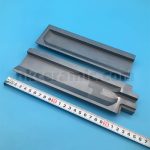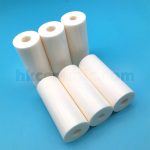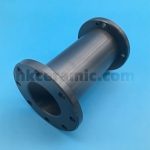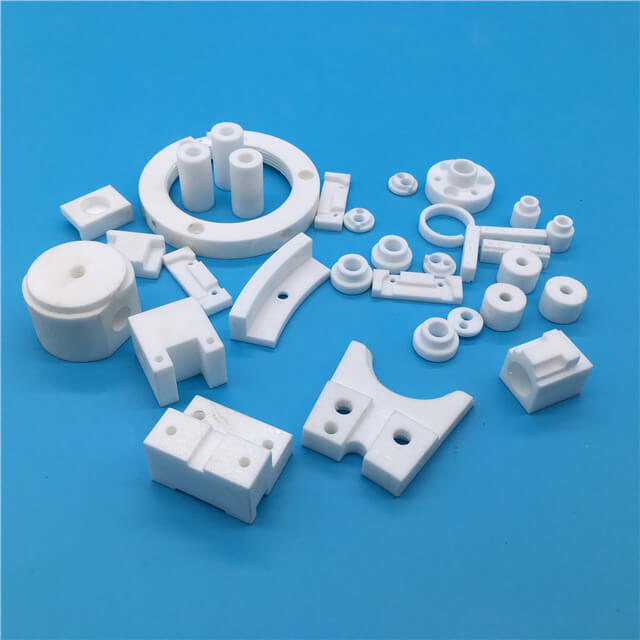Introduction to Macor Ceramic materials
Macor ceramic is versatile with high hardness, strength, and elastic modulus, ideal for industrial applications. Its temperature stability, low thermal conductivity, and thermal shock resistance suit thermal insulation, while excellent electrical insulation benefits electronic and electrical applications.
E-mail:sales01@hkceramic.com

| Plate material mm (L, H, and W can be selected as needed, customization supported) | ||||||||||||
| L | 3 | 5 | 8 | 10 | 12 | 15 | 18 | 20 | 22 | 25 | 28 | More (Customizable) |
| W*H | 100*100 | 90*140 | 95*145 | 150*150 | 160*160 | 122*290 | 110*275 | More (Customizable) | ||||
| Rod material mm (W, Ø can be selected as needed, customization supported) | ||||||||||||
| Ø | 0.5 | 0.8 | 0.9 | 1 | 1.5 | 2 | 2.5 | 3 | 3.5 | 4 | 4.5 | More (Customizable) |
| W | 60 | 100 | 120 | 200 | More (Customizable) | |||||||
Macor ceramics are very unique and useful materials that possess several compelling properties.
1. Excellent Mechanical Performance and Applications
Advanced ceramics exhibit exceptional mechanical characteristics, including high hardness, strength, and excellent compressive resistance. These properties make advanced ceramics an ideal choice for many industrial applications, especially in environments requiring materials to withstand extreme forces and wear.
- High Hardness and Strength:
- Rockwell Hardness: R45N is 40.
- Vickers Hardness (500g load): 11.5 GPa (1175 Kg/mm²).
- Modulus of Elasticity: At 25°C, the modulus of elasticity is 65 GPa.
- Flexural Strength: At 20°C, the flexural strength is 108 MPa.
- Compressive Strength: At 20°C, the compressive strength is 488 MPa.
These mechanical properties enable advanced ceramics to maintain stability under impact and stress, reducing the risk of fracture. Due to their high strength and wear resistance, advanced ceramics are commonly used to manufacture various high-performance industrial components such as parts in milling machines, sliding components, and cutting tool blades.
2. Outstanding Thermal Properties
Advanced ceramics also possess excellent thermal properties, including high temperature stability, low thermal expansion coefficient, and good thermal shock resistance.
- Maximum Operating Temperature: The maximum operating temperature is 800°C.
- Thermal Conductivity: At 25°C, thermal conductivity is 1.71 W/(m·K).
- Thermal Expansion Coefficient: The thermal expansion coefficient is 7.2 × 10⁻⁶/°C.
- Thermal Shock Stability: Thermal shock stability is 200°C.
These characteristics make advanced ceramics very useful in applications requiring insulation or thermal protection. For example, in certain chemical processing equipment and high-temperature furnaces, advanced ceramics can be used as thermal barrier coatings to help control temperature and protect sensitive mechanical components from overheating damage.
3. Excellent Electrical Performance
Advanced ceramics also demonstrate excellent electrical insulation properties, making them highly valuable in electronic and electrical applications.
- Breakdown Strength (Dielectric Strength): The breakdown strength is 30 KV/mm.
- Volume Resistivity at 20°C: At 20°C, the volume resistivity is 10¹⁶ Ω·cm.
These electrical properties make advanced ceramics very effective in high-voltage and high-frequency applications, providing reliable insulation protection.
This type of advanced ceramic material excels in various demanding application environments, particularly in fields requiring high hardness, strength, exceptional thermal, and electrical performance.
| Material Properties & Physical Performance | Units | Typical Values |
| Colour | white | |
| Density | g/cm3 | 2.6 |
| Gas permeability | 0 | |
| Water Absorption | % | 0.00% |
| Hardness | R45N | 40 |
| Vickers Hardness (Load 500g) | Gpa(Kg/mm²) | 11.5(1175) |
| Modulus of Elasticity(25℃) | Gpa | 65 |
| Flexural Strength(20℃) | Mpa | 108 |
| Compressive Strength(20℃) | Mpa | 488 |
| The rmodynamic property | Units | Typical Values |
| Maximum Use Temperature | ℃ | 800 |
| Thermal Conductivity(25℃) | W/(m·K) | 1.71 |
| Thermal Expansion Coefficient | 10-6/℃ | 7.2 |
| Thermal Shock Resistance | △T℃ | 200 |
| Electricl Protperties | Units | Typical Values |
| Dielectric Strength | KV/mm | 30 |
| Volume Resistivity at 20°C | Ω.cm | 1016 |
*For more details, please feel free to contact our company.

Silicon carbide ceramic molds
Material:Silicon Carbide Ceramics
Describe:Custom silicon carbide (SiC) ceramic molds offer high-temperature and pressure resistance, ensuring precise and consistent production results.
Silicon Nitride Ceramic Rod
Material:Silicon Nitride Ceramics
Describe:Silicon nitride ceramic rods, high-temperature shafts for petroleum pumps, and abrasion-resistant waterjet plungers are vital in industry. Known for heat resistance, wear resistance, and chemical stability, they are used in petrochemicals, manufacturing, and aerospace.

Industrial Silicon Nitride Ceramic Ring
Material:Silicon Nitride Ceramics
Describe:Industrial Silicon Nitride Ceramic Ring for high-temperature environments like heat exchangers and combustion chambers. Ideal for lightweight, high-strength applications in semiconductor manufacturing and other industries, their chemical stability and low thermal expansion coefficient ensure superior mechanical and thermal performance.

Alumina Ceramic Hollow Tube
Material:Alumina ceramics
Describe:Alumina Ceramic Hollow Tube, essential in high-tech and industrial sectors, offers excellent physical and chemical properties. Its high-purity alumina base and precision manufacturing ensure exceptional performance in extreme environments, from high temperatures to precise electrical insulation. Whether for structural support or electrical insulation, these tubes deliver reliable, durable performance.

Customized Thin Film Zirconium Oxide Ceramic Cutting Blades
Material:Zirconia Ceramics
Describe:Customized Thin Film Zirconium Oxide Ceramic Cutting Blades,also used in food filling as metering pump components. These precision-engineered units offer precise fluid control with high hardness and strength, ensuring stable performance and longevity under demanding conditions of pressure and flow.

Silicon nitride ceramic fittings
Material:Silicon Nitride Ceramics
Describe:Explore silicon nitride (Si3N4) ceramic pipe fittings with dual-flange design and multiple mounting holes, ensuring stability and safety in high-pressure and high-temperature settings. Ideal for extreme industrial conditions, known for heat resistance, wear resistance, and chemical corrosion resistance.

